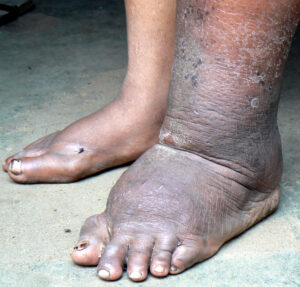
Researchers at Washington University School of Medicine in St. Louis have developed a new genomic-based approach that could aid global efforts to eliminate lymphatic filariasis, a parasitic roundworm infection spread by mosquitoes. Also known as elephantiasis, the disease can be painful and disfiguring, with damage to the lymphatic system causing limb swelling, skin thickening and swelling of the scrotum.
Co-led by Makedonka Mitreva, the Robert E. and Louise F. Dunn Professor of Medical Sciences, and Peter Fischer, a professor of medicine, the study describes a genomic-driven approach that distinguishes between the reinfection of an individual after successful treatment and the reemergence of an infection in an individual who was not fully cleared by treatment. In 2022, about 325 million people received treatment for lymphatic filariasis as part of the World Health Organization’s mass drug administration program to eliminate the parasite. This approach can be used for genomic surveillance, providing essential information for monitoring whether ongoing transmission is due to treatment failure or to human or mosquito migration.
The study appears in the journal eBioMedicine, published by The Lancet. The study was supported by the National Institutes of Health (NIH); the Foundation for Barnes-Jewish Hospital; and the Bill and Melinda Gates Foundation through the Death to Onchocerciasis and Lymphatic Filariasis (DOLF) Project.


